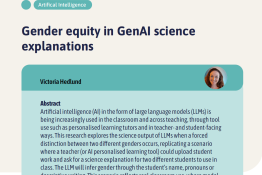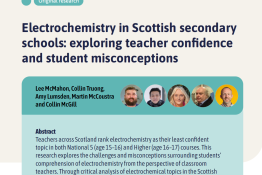Possible barriers to the effective use of practical work in school science (open access)
Issue 395 | Page 33 | Published Nov 2025
Description
Abstract
Practical work can play a very important role in the teaching and learning process in school science in contributing towards the development of students’ understanding of scientific processes and concepts, as well as in generating a positive attitude towards science in general. The purpose of this article is to identify barriers that hinder the effective use of practical work in secondary school science and to consider approaches that might help to overcome those barriers. The article distinguishes between barriers relating to resources and assessment and those that relate to teachers and technicians.
Further Reading
Gericke, N., Högström, P. and Wallin, J. (2023) A systematic review of research on laboratory work in secondary school. Studies in Science Education, 59(2), 245–285.
Millar, R. (1998) Rhetoric and reality: what practical work in science education is really for. In Practical Work in School Science: Which Way Now? ed. Wellington, J. pp. 16–31. London: Routledge.
Osborne, J. F. (1996) Untying the Gordian Knot: diminishing the role of practical work. Physics Education, 31(5), 271–278.
Woolnough, B. and Allsop, T. (1986) Practical Work in Science. Cambridge: Cambridge University Press.
References
Abrahams, I. (2009) Does practical work really motivate? A study of the affective value of practical work in secondary school science. International Journal of Science Education, 31(17), 2335–2353.
Abrahams, I. and Millar, R. (2008). Does practical work really work? A study of the effectiveness of practical work as a teaching and learning method in school science. International Journal of Science Education, 30(14), 1945–1969.
Abrahams, I., Reiss, M. J. and Sharpe, R. (2016) To DAPS or to IAPS: that is the question. In Science Education Research and Practical Work, ed. Eilks, I., Markic, S. and Ralle, B. pp. 119–130. Germany: Shaker Verlag.
Abrahams, I. and Sharpe, R. (2010) Untangling what teachers mean by the motivational value of practical work. School Science Review, 92(339), 111–115.
Bennett, J. (2003) Teaching and Learning Science: A Guide to Recent Research and its Applications. London: Continuum.
Chala, A. A. (2019) Practice and challenges facing practical work implementation in natural science subjects at secondary schools. Journal of Education and Practice, 10(31), 1–17.
CLEAPSS (2009) G228 – Technicians and their Jobs. Uxbridge.
Dillon, J. (2010) Effective practical science. School Science Review, 91(337), 36–39.
Fotou, N. and Abrahams, I. (2015) Doing with ideas: the role of talk in effective practical work in science. School Science Review, 96(359), 55–60.
Haste, H. (2004) Science in my Future: A study of Values and Beliefs in Relation to Science and Technology Amongst 11–21 Year Olds. London, Nestlé Social Research Programme.
Hattingh, A. (2007) Some factors influencing the quality of practical work in science classrooms. African Journal of Research in SMT Education, 11(1), 75–90.
Hodson, D. (1991) Practical work in science: time for a reappraisal. Studies in Science Education, 19(1), 175–184.
Menchafou, Y., Aaboud, M. and Chekour, M. (2024) Effectiveness of virtual labs for physics learning in Moroccan secondary schools. International Journal of Interactive Mobile Technologies, 18(15), 129–143.
Millar, R. and Abrahams, I. (2009) Practical work: making it more effective. School Science Review, 91(334), 59–64.
Soares, A. and Lock, R. (2007) Pre‐service science teachers’ perceptions of written lesson appraisals: the impact of styles of mentoring. European Journal of Teacher Education, 30(1), 75–90.
UK Government Official Statistics (2024) Provisional entries for GCSE, AS and A level: Summer 2024 exam series.
https://www.gov.uk/government/statistics/provisional-entries-for-gcse-as-and-a-level-summer-2024-exam-series/provisional-entries-for-gcseas-and-a-level-summer-2024-exam-series#as-and-a-level-entries
Wellington, J. (2005) Practical work in the affective domain. In Beyond Cartesian Dualism: Encountering Affect in the Teaching and Learning of Science, ed. Alsop, S. 99–110. Dordrecht: Springer.
White Rose University Consortium Team (2005) The continuing professional development of science teachers: a discussion paper. School Science Review, 87(318), 105–111.
Woodley, E. (2009) Practical work in school science – why is it important? School Science Review, 91(335), 49–51.
More from this issue
Abstract
Artificial intelligence (AI) in the form of large language models (LLMs) is being increasingly used in the...
Henry Ward shares a linguistic–rhetorical approach to building higher-order literacy skills in science.
Resource production...
Abstract
Teachers across Scotland rank electrochemistry as their least confident topic in both National 5 (age 15–16) and...




